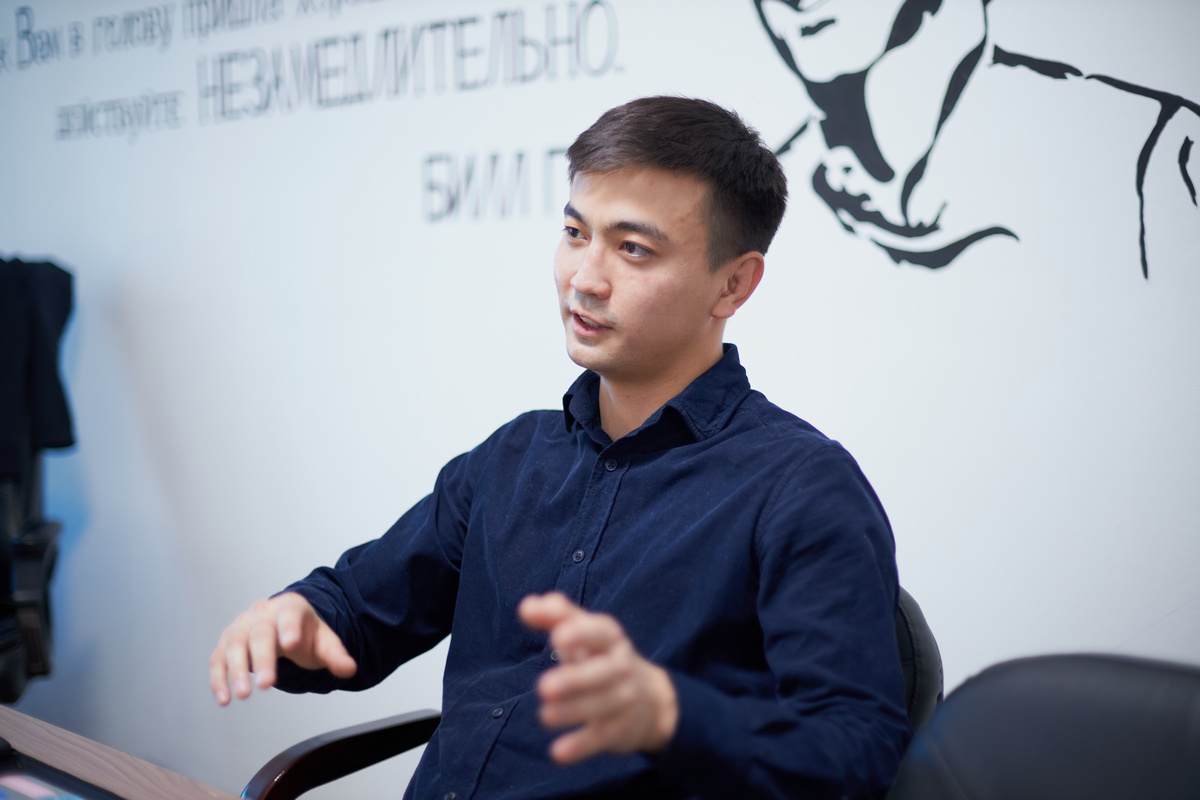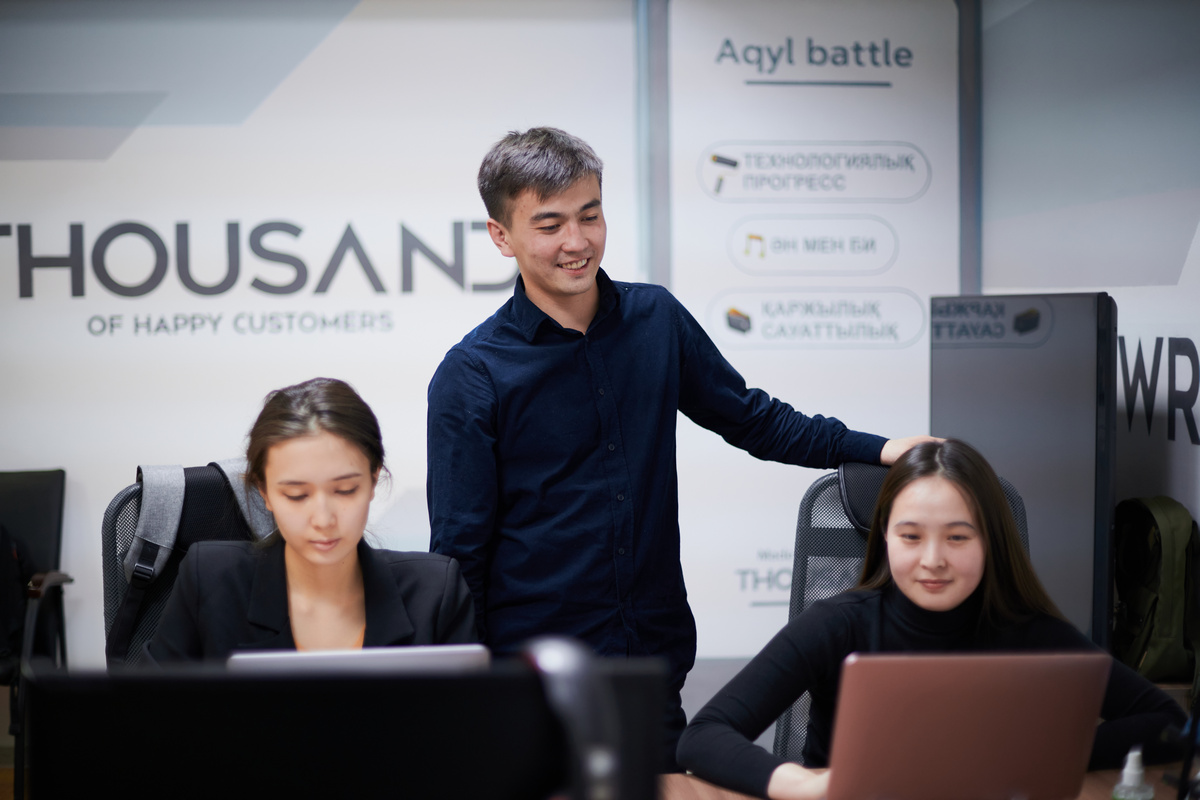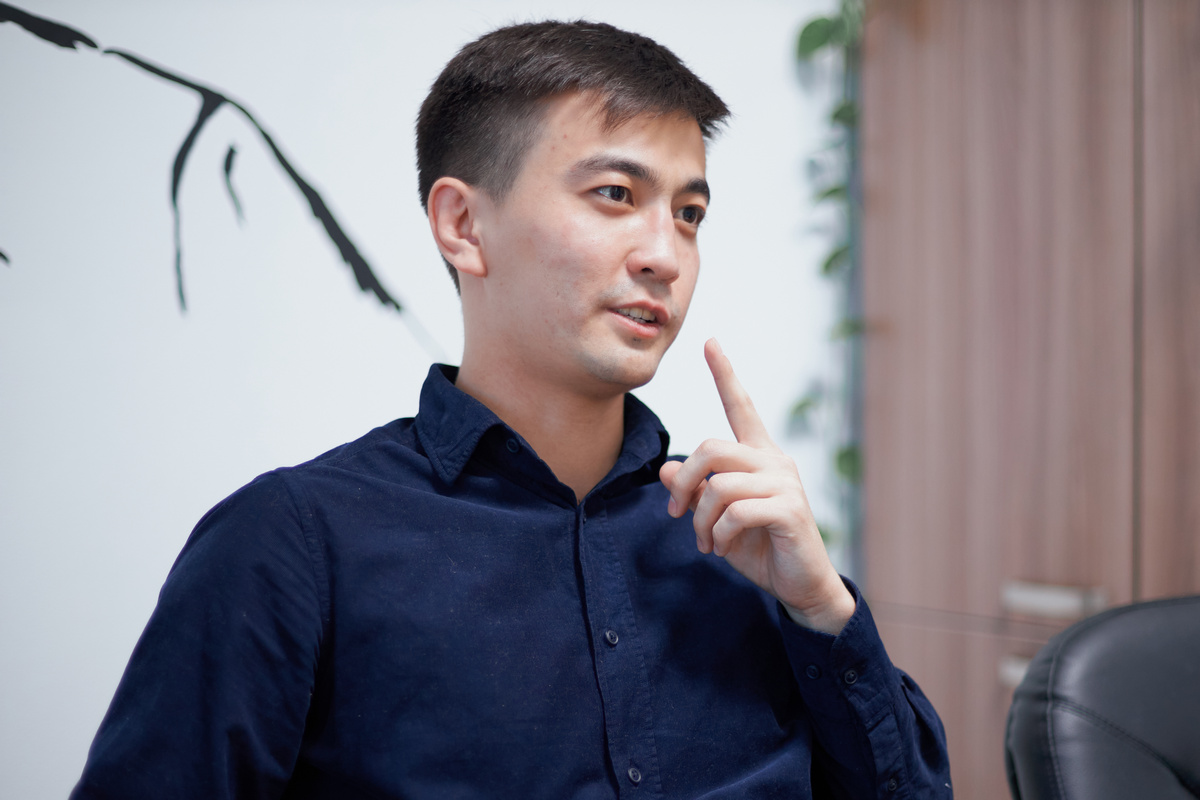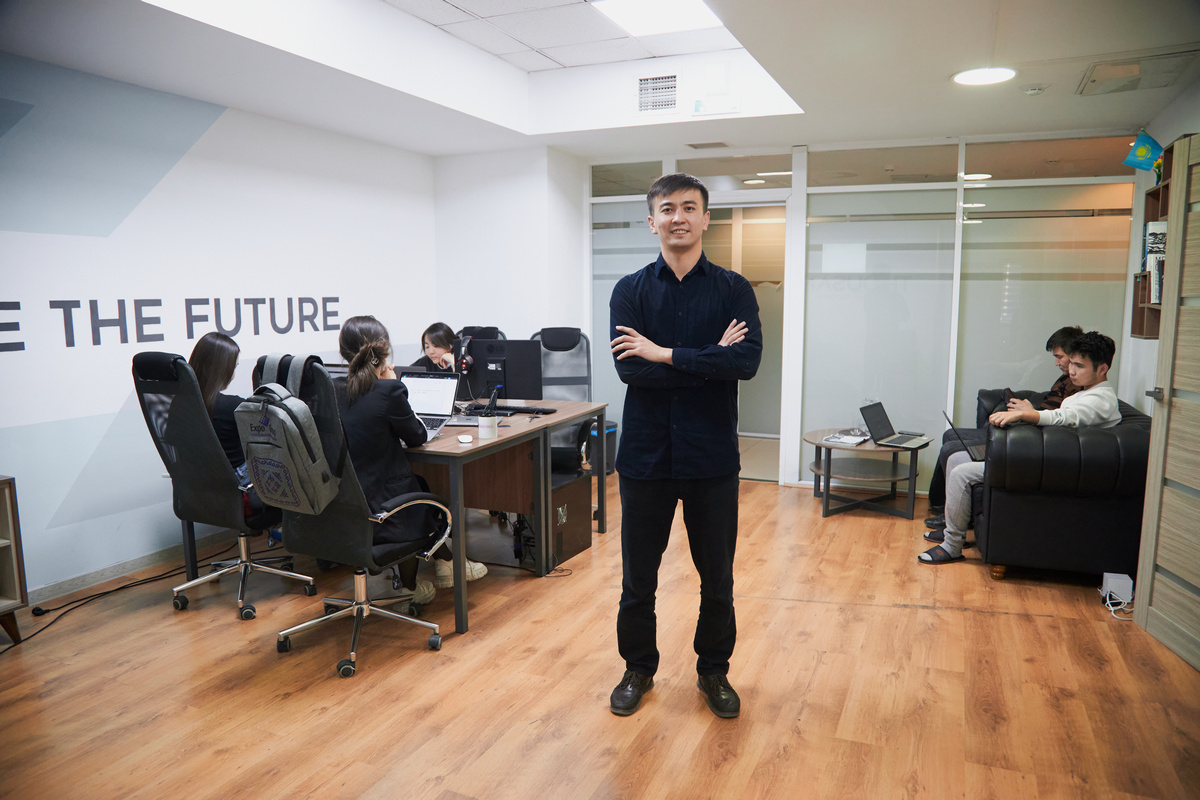“Outsourcing equipped me with a strong visual acumen”
–Share your journey of entering the startup industry, including how you initially started.
– I am a professional in the field of IT, having graduated from IITU in Almaty with a specialization in Information Systems. Initially, my plan was to pursue a specialization in oil studies at KBTU, given my origin from Western Kazakhstan. However, due to a lack of grants for such studies that year, I shifted my focus to IT. My interest in this field grew during my studies as I delved into various articles, aided by the guidance of excellent professors. One of my professors was Almas Tuyakbayev, a partner of Arman Suleimenov and the founder of nFactorial Incubator. Under his mentorship, I also became involved in valuable events in the industry.
Subsequently, I developed a desire not only for programming but also for launching projects capable of instigating meaningful change.
I began my involvement in startups in 2014 while simultaneously pursuing my Master’s degree. The initial project was named Irbi, and among our co-founders was Alim Hamitov, who currently serves as the managing partner of MOST Ventures. In 2016, we received an invitation to participate in a Silicon Valley program and visited the USA. Upon returning to Kazakhstan, I made the final decision to concentrate on IT projects.
– Can you recall the impressions you had during that trip?
– After returning, I experienced three months of depression and complete lack of focus. Shortly before that, we received firsthand information about Facebook’s acquisition of MSQRD from the venture investor Nikolay Davydov. It felt like we were not on the right path. Alongside the startup, we also ran an educational center to prepare school pupils for the UNT and international exams. Consequently, we decided to sell it.

Later, with another business partner, I founded an outsourcing company called Thousand, specializing in the development of mobile applications. Initially, our goal was to launch a startup facilitating the discovery of freelancers for diverse tasks. To bring this idea to life, we sought funds and opted to earn them independently. Consequently, we decided to attract investments, and over the course of seven years, we successfully executed more than 200 projects, including the Digital Bridge application for Astana Hub.
Despite being unable to materialize our initial idea, the desire to launch something of my own always lingered. This led to the creation of Aqyl Battle. We are still taking on orders. For instance, this year, we expanded the scope of our projects through the Global Outsource acceleration program.
– Do you feel any regret about dedicating several years to developing projects on orders instead of focusing on your own venture?
– Outsourcing honed my visual acuity. I examined the successes and failures of others’ projects, drawing conclusions. Some faced challenges with the team, others struggled with budget constraints, and some ideas simply didn’t take off. This collective experience proved invaluable when launching our startup. Concurrently with our client projects, we engaged in joint initiatives with the muftiate, handling the technical aspects free of charge. Interestingly, there are few companies dedicated to Muslim Tech projects despite the substantial demand for them.
“The total number of registrations in our applications is 650,000”
– Can you provide a description of the game?
Aqyl Battle is an internet quiz presented as a head-to-head competition between two players. Each game comprises five rounds, with each round featuring three questions spanning various topics, including logic, notable personalities, automobile brands, or flags from various countries. Participants take turns choosing topics and responding to questions within a specified time frame. For instance, questions might involve the year of the first domain registration or the capital of Rwanda. The victorious player claims a portion of the opponent’s points as the ultimate outcome.

– What inspired the creation of an intellectual game in the Kazakh language?
– I contemplated various ideas and recalled my passion for intellectual games. During my student years, I engaged in an online quiz named “The Battle of Brains,” where we competed with fellow students and even professors. It later transpired that it was a localized version of the Swedish project Quizduel designed for the CIS countries. These applications typically feature questions on broad topics like flora, fauna, history, geography, and more.
Utilizing our proficiency in mobile applications, we found the intellectual games direction to be the most promising. Initially, we anticipated completing it within one month, but we encountered several nuances during the development stage. The game mechanics required continuous refinement. By the summer of 2022, we had prepared the test version, and in September, we officially launched the complete version.
Concerning the language selection, we collaborated with a blogger friend who had an audience exceeding two million and was successfully selling educational content. Our focus was on targeting his subscribers. Thanks to the advertising efforts, in the initial month, our MAU reached 372 thousand. The peak of application downloads occurred in September of the previous year.
– What is the size of the team working on the game, and what was the expenditure for its development?
– Assessing the costs of game development is challenging, perhaps only measurable through the salaries of our team. Initially, we allocated a team for hypothesis testing, and this team transitioned to stay on for project development. Currently, there are 10 individuals working on the game, encompassing Android and iOS developers, a backend developer, QA, and a designer. The team also incorporates the content department and marketing, with some staff members being outsourced.

– Did you allocate additional funds for advertising?
– The referral program continued to be effective, with users inviting friends and relatives through WhatsApp to earn bonuses. The total number of registrations in the application has now reached 650 thousand, predominantly consisting of the Kazakh-speaking audience. The Russian version was launched only recently.
Aqyl Battle serves as a casual time-filler, played during commutes, spare moments, and even during tois. There’s a story where a guy, wanting to get a girl’s phone number, suggested playing Aqyl Battle. For each victory, the girl revealed one digit of her phone number.
“The winner of one of our raffles traveled to Dubai, even though she had never been to Almaty or Astana”
– What sets your application apart from those of competitors?
– In other games of a similar nature, I frequently experienced prolonged waiting times for opponents to respond to questions. In our application, you have the option to play at any time with a random opponent, face multiple opponents, or create a closed tournament exclusively for friends.
Currently, we offer 40 categories of questions, encompassing topics such as Kazakh traditions and proverbs. Engaging in our game ensures that players inevitably acquire new knowledge. In contrast, the Battle of Games features only six categories without any local thematic elements.
– What is the number of regular Kazakh players on Aqyl Battle?
– During regular periods without push marketing, the application’s Daily Active Users (DAU) range from 10,000 to 15,000. We consistently organize championships with prize raffles, and during these events, the average number of unique visitors climbs to 35,000 to 45,000, reaching a peak of 114,000. Users spend approximately 1 hour and 24 minutes daily in the application.

– Please describe your incentive program.
– This spring, we began contemplating ways to retain users within the application. Some players have engaged in 4,000 games, accumulating over a million points. Creating new questions for such dedicated players becomes challenging. In an effort to prevent users from canceling their subscription and to provide an avenue for them to exchange their points for something valuable, we opted to organize contests and attract sponsors. Through a partnership with a travel agency, we conducted raffles for several tours. Thanks to this collaboration, one participant, who had never even been to Almaty or Astana, won a trip to Dubai.
In instances where we cannot secure sponsors, we allocate our funds to acquire electronics and gadgets as prizes. Additionally, we collaborate with authors of educational courses and books. We subsequently publish championship results on social networks, demonstrating our commitment to fulfilling promises. This transparency fosters trust, encouraging people to participate in our questionnaires.
In Kazakhstan, there is an issue with ludomania and a tendency towards betting addiction. Through our example, we aim to showcase that valuable prizes can be obtained through education. In a recent tournament, we conducted a raffle for free preparation for the Bolashak and other educational programs. The annual value of such education with assistance averages $10,000. We are now preparing to raffle grants from KAZGUU and IITU during a separate tournament.
“For the initial three months, Google consistently remitted $30,000 to us for advertising within our application”
– How do you generate revenue from it?
– In the initial eight months, the project experienced active revenue generation. Observing the rapid expansion of our audience, we incorporated Google’s AdMob tool to display ads in the application. Simultaneously, we introduced a subscription priced at 500 tenge to provide an ad-free playing experience, although the free version remains more popular. The subscription model, as a whole, is not widely embraced in Kazakhstan, and I believe it will likely gain popularity no earlier than in the next five years.
Gradually, the traffic started to decline, along with the income from ads. If we had launched in a larger market, the profit would have been different; in Europe and the USA, the cost of displaying ads is higher than in Central Asia. Despite this, for the initial three months, Google consistently paid us $30,000 for advertising within our application. Subsequently, the amount decreased to $25,000 and continued to decline. This prompted us to consider creating content in other languages to tap into new audiences.
Currently, we are operating at a loss, but we anticipate that online tournaments will help improve the situation. The revenue from the initial sale of tickets reached two million tenge. Additionally, we held a collaborative offline tournament with the Ministry of Culture. This event included qualification games, and we invited finalists from various regions to Astana for the grand final.

“Understanding the opinions and needs of the audience is as important as developing a product”
– Do you create quiz questions independently?
– Initially, we created questions ourselves, but now we buy them since there are numerous categories that need regular updates and translations. It’s challenging to be an expert in all areas, and users always demand fresh content. While we aim to integrate AI technologies in the future, we currently lack the necessary expertise. For instance, ChatGPT doesn’t produce high-quality content in the Kazakh language.
Ideally, AI would assist us in improving the selection of questions based on the player’s nationality. Although our current system addresses this issue, there is room for further enhancement. We are currently gathering data, and we already have ideas on how to leverage it. By analyzing which categories of questions are more popular and vice versa, such analytics will aid in implementing new services in the future.
– In the fall of 2023, you took part in the acceleration program of Astana Hub and Google. What insights did you gain after its completion?
– I became aware of Silkway after the second batch and applied for the third one, but unfortunately, I didn’t pass. However, I succeeded in joining the fourth batch. Initially, I didn’t fully grasp the value of tracking, but during the first traction meeting, our mistakes were promptly highlighted. Initially, it was challenging for me to accept the criticism, and I even questioned whether it was worth continuing the participation. However, after calming down, we decided to persist. Thanks to that decision, we attracted 30 thousand new users and successfully launched the tournaments feature.
Previously, we intuitively attracted an audience without a clear understanding of who these people were. However, during the accelerator, we tested numerous hypotheses and conducted over 150 interviews.
Coming from the IT sphere, I was initially more inclined towards the functional aspect. However, I discovered that understanding the opinions and needs of the audience is equally crucial to developing the product. Every entrepreneur faces psychological blocks that can hinder their development, as well as that of the team. If there’s a shift in the founder’s mindset, the company can initiate growth.

– What are the current obstacles impeding the development of the game?
– I believe the challenges lie in creating new content and game mechanics. We are currently in search of an individual who can assist us in implementing in-game purchases, similar to other games, as there is a willingness among users to pay for such features. It’s possible that we might need to enlist the help of a foreign specialist since we haven’t been able to find such expertise in Kazakhstan. Additionally, we consistently work on enhancing the system to address issues like cheating, where some individuals try to Google answers or engage in other fraudulent activities to gain points.
– Could you share your plans?
–Recently, we were speakers at the Invest Day hosted by Astana Hub, following which we initiated negotiations with potential investors. Currently, our funds are sufficient, and we plan to actively seek investments starting next year. We also identify potential opportunities in entering the markets of Turkey and MENA countries, where there is a significant demand for mobile and casual games. In our case, it aligns logically as the word Aqyl itself, meaning intelligence, is present in the languages of many countries.
Istanbul is acknowledged as one of the global hubs for the gaming industry. In the last six months, local game developers have secured more investments than Great Britain and Scandinavia combined in this sector. In Istanbul alone, there are over 300 companies involved in the development of mobile games. The reach extends to over 70% of the adult population in Turkey, totaling 44 million gamers. The MENA region closely mirrors these figures.
We are also contemplating the scaling of our operations to CIS countries and are in the process of translating content into Russian. Recently, I visited Uzbekistan and identified growth potential in the region. To facilitate this expansion, our game needs translation into Uzbek, along with the localization of a portion of the questions. The same strategy applies to other Turkic-speaking countries.
We are currently translating the content into English, Turkish, and Arabic. Next year, we will begin testing hypotheses and make final decisions. Overall, our goal is to make our content multilingual and bring together users from different countries on one platform.

“Outsourcing equipped me with a strong visual acumen”
–Share your journey of entering the startup industry, including how you initially started.
– I am a professional in the field of IT, having graduated from IITU in Almaty with a specialization in Information Systems. Initially, my plan was to pursue a specialization in oil studies at KBTU, given my origin from Western Kazakhstan. However, due to a lack of grants for such studies that year, I shifted my focus to IT. My interest in this field grew during my studies as I delved into various articles, aided by the guidance of excellent professors. One of my professors was Almas Tuyakbayev, a partner of Arman Suleimenov and the founder of nFactorial Incubator. Under his mentorship, I also became involved in valuable events in the industry.
Subsequently, I developed a desire not only for programming but also for launching projects capable of instigating meaningful change.
I began my involvement in startups in 2014 while simultaneously pursuing my Master’s degree. The initial project was named Irbi, and among our co-founders was Alim Hamitov, who currently serves as the managing partner of MOST Ventures. In 2016, we received an invitation to participate in a Silicon Valley program and visited the USA. Upon returning to Kazakhstan, I made the final decision to concentrate on IT projects.
– Can you recall the impressions you had during that trip?
– After returning, I experienced three months of depression and complete lack of focus. Shortly before that, we received firsthand information about Facebook’s acquisition of MSQRD from the venture investor Nikolay Davydov. It felt like we were not on the right path. Alongside the startup, we also ran an educational center to prepare school pupils for the UNT and international exams. Consequently, we decided to sell it.

Later, with another business partner, I founded an outsourcing company called Thousand, specializing in the development of mobile applications. Initially, our goal was to launch a startup facilitating the discovery of freelancers for diverse tasks. To bring this idea to life, we sought funds and opted to earn them independently. Consequently, we decided to attract investments, and over the course of seven years, we successfully executed more than 200 projects, including the Digital Bridge application for Astana Hub.
Despite being unable to materialize our initial idea, the desire to launch something of my own always lingered. This led to the creation of Aqyl Battle. We are still taking on orders. For instance, this year, we expanded the scope of our projects through the Global Outsource acceleration program.
– Do you feel any regret about dedicating several years to developing projects on orders instead of focusing on your own venture?
– Outsourcing honed my visual acuity. I examined the successes and failures of others’ projects, drawing conclusions. Some faced challenges with the team, others struggled with budget constraints, and some ideas simply didn’t take off. This collective experience proved invaluable when launching our startup. Concurrently with our client projects, we engaged in joint initiatives with the muftiate, handling the technical aspects free of charge. Interestingly, there are few companies dedicated to Muslim Tech projects despite the substantial demand for them.
“The total number of registrations in our applications is 650,000”
– Can you provide a description of the game?
Aqyl Battle is an internet quiz presented as a head-to-head competition between two players. Each game comprises five rounds, with each round featuring three questions spanning various topics, including logic, notable personalities, automobile brands, or flags from various countries. Participants take turns choosing topics and responding to questions within a specified time frame. For instance, questions might involve the year of the first domain registration or the capital of Rwanda. The victorious player claims a portion of the opponent’s points as the ultimate outcome.

– What inspired the creation of an intellectual game in the Kazakh language?
– I contemplated various ideas and recalled my passion for intellectual games. During my student years, I engaged in an online quiz named “The Battle of Brains,” where we competed with fellow students and even professors. It later transpired that it was a localized version of the Swedish project Quizduel designed for the CIS countries. These applications typically feature questions on broad topics like flora, fauna, history, geography, and more.
Utilizing our proficiency in mobile applications, we found the intellectual games direction to be the most promising. Initially, we anticipated completing it within one month, but we encountered several nuances during the development stage. The game mechanics required continuous refinement. By the summer of 2022, we had prepared the test version, and in September, we officially launched the complete version.
Concerning the language selection, we collaborated with a blogger friend who had an audience exceeding two million and was successfully selling educational content. Our focus was on targeting his subscribers. Thanks to the advertising efforts, in the initial month, our MAU reached 372 thousand. The peak of application downloads occurred in September of the previous year.
– What is the size of the team working on the game, and what was the expenditure for its development?
– Assessing the costs of game development is challenging, perhaps only measurable through the salaries of our team. Initially, we allocated a team for hypothesis testing, and this team transitioned to stay on for project development. Currently, there are 10 individuals working on the game, encompassing Android and iOS developers, a backend developer, QA, and a designer. The team also incorporates the content department and marketing, with some staff members being outsourced.

– Did you allocate additional funds for advertising?
– The referral program continued to be effective, with users inviting friends and relatives through WhatsApp to earn bonuses. The total number of registrations in the application has now reached 650 thousand, predominantly consisting of the Kazakh-speaking audience. The Russian version was launched only recently.
Aqyl Battle serves as a casual time-filler, played during commutes, spare moments, and even during tois. There’s a story where a guy, wanting to get a girl’s phone number, suggested playing Aqyl Battle. For each victory, the girl revealed one digit of her phone number.
“The winner of one of our raffles traveled to Dubai, even though she had never been to Almaty or Astana”
– What sets your application apart from those of competitors?
– In other games of a similar nature, I frequently experienced prolonged waiting times for opponents to respond to questions. In our application, you have the option to play at any time with a random opponent, face multiple opponents, or create a closed tournament exclusively for friends.
Currently, we offer 40 categories of questions, encompassing topics such as Kazakh traditions and proverbs. Engaging in our game ensures that players inevitably acquire new knowledge. In contrast, the Battle of Games features only six categories without any local thematic elements.
– What is the number of regular Kazakh players on Aqyl Battle?
– During regular periods without push marketing, the application’s Daily Active Users (DAU) range from 10,000 to 15,000. We consistently organize championships with prize raffles, and during these events, the average number of unique visitors climbs to 35,000 to 45,000, reaching a peak of 114,000. Users spend approximately 1 hour and 24 minutes daily in the application.

– Please describe your incentive program.
– This spring, we began contemplating ways to retain users within the application. Some players have engaged in 4,000 games, accumulating over a million points. Creating new questions for such dedicated players becomes challenging. In an effort to prevent users from canceling their subscription and to provide an avenue for them to exchange their points for something valuable, we opted to organize contests and attract sponsors. Through a partnership with a travel agency, we conducted raffles for several tours. Thanks to this collaboration, one participant, who had never even been to Almaty or Astana, won a trip to Dubai.
In instances where we cannot secure sponsors, we allocate our funds to acquire electronics and gadgets as prizes. Additionally, we collaborate with authors of educational courses and books. We subsequently publish championship results on social networks, demonstrating our commitment to fulfilling promises. This transparency fosters trust, encouraging people to participate in our questionnaires.
In Kazakhstan, there is an issue with ludomania and a tendency towards betting addiction. Through our example, we aim to showcase that valuable prizes can be obtained through education. In a recent tournament, we conducted a raffle for free preparation for the Bolashak and other educational programs. The annual value of such education with assistance averages $10,000. We are now preparing to raffle grants from KAZGUU and IITU during a separate tournament.
“For the initial three months, Google consistently remitted $30,000 to us for advertising within our application”
– How do you generate revenue from it?
– In the initial eight months, the project experienced active revenue generation. Observing the rapid expansion of our audience, we incorporated Google’s AdMob tool to display ads in the application. Simultaneously, we introduced a subscription priced at 500 tenge to provide an ad-free playing experience, although the free version remains more popular. The subscription model, as a whole, is not widely embraced in Kazakhstan, and I believe it will likely gain popularity no earlier than in the next five years.
Gradually, the traffic started to decline, along with the income from ads. If we had launched in a larger market, the profit would have been different; in Europe and the USA, the cost of displaying ads is higher than in Central Asia. Despite this, for the initial three months, Google consistently paid us $30,000 for advertising within our application. Subsequently, the amount decreased to $25,000 and continued to decline. This prompted us to consider creating content in other languages to tap into new audiences.
Currently, we are operating at a loss, but we anticipate that online tournaments will help improve the situation. The revenue from the initial sale of tickets reached two million tenge. Additionally, we held a collaborative offline tournament with the Ministry of Culture. This event included qualification games, and we invited finalists from various regions to Astana for the grand final.

“Understanding the opinions and needs of the audience is as important as developing a product”
– Do you create quiz questions independently?
– Initially, we created questions ourselves, but now we buy them since there are numerous categories that need regular updates and translations. It’s challenging to be an expert in all areas, and users always demand fresh content. While we aim to integrate AI technologies in the future, we currently lack the necessary expertise. For instance, ChatGPT doesn’t produce high-quality content in the Kazakh language.
Ideally, AI would assist us in improving the selection of questions based on the player’s nationality. Although our current system addresses this issue, there is room for further enhancement. We are currently gathering data, and we already have ideas on how to leverage it. By analyzing which categories of questions are more popular and vice versa, such analytics will aid in implementing new services in the future.
– In the fall of 2023, you took part in the acceleration program of Astana Hub and Google. What insights did you gain after its completion?
– I became aware of Silkway after the second batch and applied for the third one, but unfortunately, I didn’t pass. However, I succeeded in joining the fourth batch. Initially, I didn’t fully grasp the value of tracking, but during the first traction meeting, our mistakes were promptly highlighted. Initially, it was challenging for me to accept the criticism, and I even questioned whether it was worth continuing the participation. However, after calming down, we decided to persist. Thanks to that decision, we attracted 30 thousand new users and successfully launched the tournaments feature.
Previously, we intuitively attracted an audience without a clear understanding of who these people were. However, during the accelerator, we tested numerous hypotheses and conducted over 150 interviews.
Coming from the IT sphere, I was initially more inclined towards the functional aspect. However, I discovered that understanding the opinions and needs of the audience is equally crucial to developing the product. Every entrepreneur faces psychological blocks that can hinder their development, as well as that of the team. If there’s a shift in the founder’s mindset, the company can initiate growth.

– What are the current obstacles impeding the development of the game?
– I believe the challenges lie in creating new content and game mechanics. We are currently in search of an individual who can assist us in implementing in-game purchases, similar to other games, as there is a willingness among users to pay for such features. It’s possible that we might need to enlist the help of a foreign specialist since we haven’t been able to find such expertise in Kazakhstan. Additionally, we consistently work on enhancing the system to address issues like cheating, where some individuals try to Google answers or engage in other fraudulent activities to gain points.
– Could you share your plans?
–Recently, we were speakers at the Invest Day hosted by Astana Hub, following which we initiated negotiations with potential investors. Currently, our funds are sufficient, and we plan to actively seek investments starting next year. We also identify potential opportunities in entering the markets of Turkey and MENA countries, where there is a significant demand for mobile and casual games. In our case, it aligns logically as the word Aqyl itself, meaning intelligence, is present in the languages of many countries.
Istanbul is acknowledged as one of the global hubs for the gaming industry. In the last six months, local game developers have secured more investments than Great Britain and Scandinavia combined in this sector. In Istanbul alone, there are over 300 companies involved in the development of mobile games. The reach extends to over 70% of the adult population in Turkey, totaling 44 million gamers. The MENA region closely mirrors these figures.
We are also contemplating the scaling of our operations to CIS countries and are in the process of translating content into Russian. Recently, I visited Uzbekistan and identified growth potential in the region. To facilitate this expansion, our game needs translation into Uzbek, along with the localization of a portion of the questions. The same strategy applies to other Turkic-speaking countries.
We are currently translating the content into English, Turkish, and Arabic. Next year, we will begin testing hypotheses and make final decisions. Overall, our goal is to make our content multilingual and bring together users from different countries on one platform.







